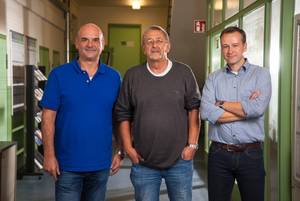Sustainability Needs Catalysis Research
29 September 2017
 |
"Unifying Systems in Catalysis" (UniSysCat - "Vereinigung von Systemen in der Katalyse"), the succession project of UniCat, is qualified for submitting a full proposal. Today, the German Research Foundation [Deutsche Forschungsgemeinschaft, DFG] announced that the draft proposal UniSysCat is among those initiatives, who have qualified for submitting a full proposal within the German Strategy for Excellence.
Link to DFG: Liste aller zum Vollantrag aufgeforderte Projekte [only German]
This is a great step forward for UniCat’s follow-up project which is called „Unifying Systems in Catalysis, or UniSysCat for short. The three coordinators of the UniSysCat draft proposal are delighted.
“Anyone talking about energy and resource-friendly production today is talking about catalysis”, believes Professor Dr. Matthias Driess, Head of Organometallic Chemistry and Inorganic Materials at TU Berlin. He is one of three designated cluster spokespersons for UniSysCat.
Catalysis is viewed as one of the key scientific and economic technologies for transition to more sustainable production and industry. “Individual catalytic processes are already clearly understood”, says Professor Dr. Arne Thomas, Head of Functional Materials at TU Berlin, also a designated spokesperson for UniSysCat: “However, our central scientific objective is to bring about a genuine paradigm shift in research: deciphering, generation and control of reaction networks in chemical and biological catalysis – i.e. a full system of reactions.”
The experimental coupling of catalytic and non-catalytic processes to an overall system assumes a comprehensive understanding of all individual primary steps. “In this respect UniSysCat may build on internationally recognized research and the extensive experimental and theoretical arsenal of methods for UniCat, which has been an Cluster of Excellence at TU Berlin since 2007”, says Professor Dr. Peter Hildebrandt, the third designated spokesperson. He is Head of Physical Chemistry and Biophysical Chemistry at TU Berlin.
Systems targeted within the framework of UniSysCat include a variety of coupled catalytic and non-catalytic processes. The interaction of such processes in terms of space and time is extremely important for the sequence and control of the overall system. As a result, these coupling principles must first be decoded: for example transfer - adjusted in terms of time and space - and activation of substrates, intermediates and products, or cooperation between different catalytic centers.
The goal of UniSysCat is to further strengthen and expand catalysis as an outstanding research field in Berlin. The focus here is on promoting young scientists.
Designated spokespersons:
Prof. Dr. Matthias Driess
Straße des 17. Juni 115
10623 Berlin
E-Mail: matthias.driess(at)tu-berlin.de
Tel.: +49 (0)30 314 29731
Prof. Dr. Arne Thomas
Hardenbergstr. 40
10623 Berlin
E-Mail: arne.thomas(at)tu-berlin.de
Tel.: +49 (0)30 314 28875
Prof. Dr. Peter Hildebrandt
Straße des 17. Juni 135
10623 Berlin
E-Mail: hildebrandt@chem.tu-berlin.de
Tel.: +49 (0)30 314 21419
